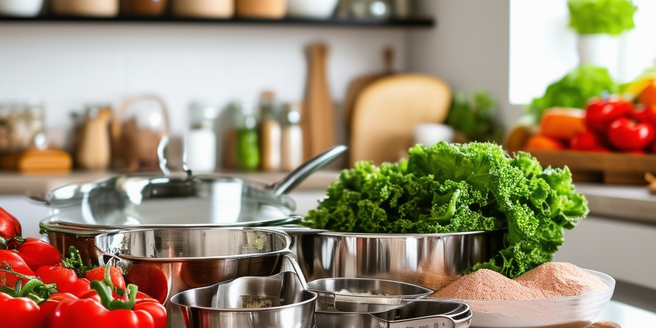Free Cooking Classes For Beginners

Understanding the Basics: Getting Started in the Kitchen
Taking the first step in the kitchen can be quite daunting, but understanding the basics is crucial. Begin by familiarizing yourself with how to handle different types of kitchen equipment. This includes gaining a thorough understanding of how to use knives safely—knowing the different types of knives, how to hold them properly, and the safest ways to cut and chop various ingredients. Learn how to measure ingredients accurately; whether you’re using cups, spoons, or a kitchen scale, precision is key in cooking and baking.
In addition to mastering equipment and measurement, it’s vital to get a good grasp of common cooking techniques such as boiling, sautéing, and baking. These techniques form the backbone of many recipes and are essential skills for any budding chef. Knowing the correct way to boil vegetables can help retain their nutrients and flavor, while mastering the art of sautéing can enhance the taste and texture of your dishes.
Ultimately, spending the time to learn and practice these skills at the beginning will pay off tremendously, making cooking a rewarding and fulfilling experience.
Essential Tools and Ingredients for Beginner Cooks
Equipping your kitchen with the right tools and ingredients is essential for beginner cooks. Begin with basic tools like a good set of knives, cutting boards, measuring cups, and pots and pans. A reliable set of knives will make preparation more efficient and safer, while cutting boards are crucial for proper hygiene and ease of use. Measuring cups ensure accurate ingredient proportions, and a variety of pots and pans will allow you to cook a wide range of dishes.
In addition to the tools, stock your pantry with essential ingredients such as spices, oils, and staples like rice and pasta. Spices are vital for adding flavor to your dishes, and having a good variety means you can explore different cuisines easily. Oils, such as olive oil and vegetable oil, are necessary for cooking and dressing salads. Staples like rice and pasta serve as the foundation for many meals and can be paired with various sauces and proteins.
With a well-equipped kitchen, you’ll find it less daunting to try out new techniques and dishes. This gradual improvement builds your confidence and expands your culinary repertoire, making cooking an enjoyable and rewarding experience.
Mastering Simple Recipes: Step-by-Step Guides
Starting with simple recipes is a great way to build your confidence in the kitchen. Look for recipes that include clear, step-by-step instructions. Focus on dishes that you can easily manage and don’t require too many complicated techniques or hard-to-find ingredients. Practice making dishes like scrambled eggs, pasta, and stir-fry. Once you get the hang of these basics, you’ll start to feel more at home in the kitchen.
As you become more comfortable, gradually try more complex recipes. Don’t be afraid to explore dishes that involve baking, grilling, or even international cuisines. Each successful dish will boost your confidence and skills, setting the stage for more advanced culinary endeavors. Remember, cooking is as much about enjoying the process as it is about the final product. The more you practice, the more you’ll understand the nuances of different flavors and techniques, making each meal a potential masterpiece in the making.
Common Cooking Mistakes and How to Avoid Them
Even the most experienced cooks make mistakes. Common errors include overcooking or undercooking, using too much or too little seasoning, and not properly following a recipe. To avoid these pitfalls, always read recipes thoroughly before starting, use timers, and taste as you go. It can also be helpful to familiarize yourself with the ingredients beforehand. Another tip is to prepare and measure all your ingredients before you start cooking. Practice makes perfect, and with time, you’ll notice improvement in your cooking skills. Additionally, don’t hesitate to ask for advice or watch tutorials for techniques you’re uncertain about. Learning from mistakes is part of the process, so don’t be discouraged. Each mistake is a learning opportunity that brings you one step closer to mastering the kitchen.
Exploring Different Cuisines: A Beginner’s Journey
One of the joys of cooking is exploring the vast array of cuisines from around the world. Start by familiarizing yourself with different ingredients and cooking techniques unique to each cuisine. Experiment with dishes from cultures such as Italian, Chinese, Mexican, and Indian. This exploration will not only expand your palate but also enrich your cooking repertoire, making you a more versatile and confident cook.
To dive deeper, begin by sourcing authentic ingredients from specialty stores or local markets that offer a variety of international products. Taking the time to understand the origins and traditional uses of these ingredients will add depth to your culinary journey. Beyond just cooking the food, learning about the cultural context and history behind each dish can provide a greater appreciation for the meals you prepare.
Participating in cooking classes or workshops led by experts from those cuisines will further hone your skills. This multifaceted approach to exploring global cuisines can transform your kitchen into a place of endless discovery, ensuring that your cooking adventures are both enjoyable and educational.